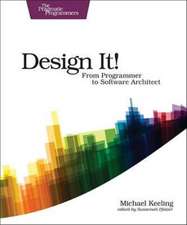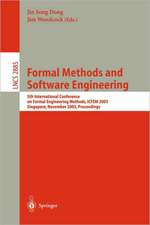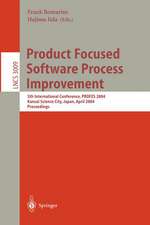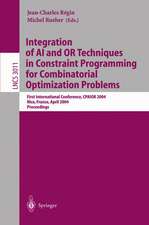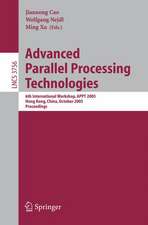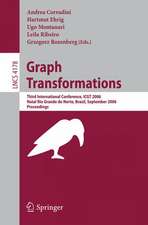Formal Methods and Software Development. Proceedings of the International Joint Conference on Theory and Practice of Software Development (TAPSOFT), Berlin, March 25-29, 1985: Volume 2: Colloquium on Software Engineering (CSE): Lecture Notes in Computer Science, cartea 186
Editat de Hartmut Ehrig, Christiane Floyd, Maurice Nivat, James Thatcheren Limba Engleză Paperback – mar 1985
Din seria Lecture Notes in Computer Science
- 20%
 Preț: 1061.55 lei
Preț: 1061.55 lei - 20%
 Preț: 307.71 lei
Preț: 307.71 lei - 20%
 Preț: 438.69 lei
Preț: 438.69 lei - 20%
 Preț: 645.28 lei
Preț: 645.28 lei -
 Preț: 410.88 lei
Preț: 410.88 lei - 15%
 Preț: 580.46 lei
Preț: 580.46 lei - 17%
 Preț: 427.22 lei
Preț: 427.22 lei - 20%
 Preț: 596.46 lei
Preț: 596.46 lei -
 Preț: 381.21 lei
Preț: 381.21 lei - 20%
 Preț: 353.50 lei
Preț: 353.50 lei - 20%
 Preț: 1414.79 lei
Preț: 1414.79 lei - 20%
 Preț: 309.90 lei
Preț: 309.90 lei - 20%
 Preț: 583.40 lei
Preț: 583.40 lei - 20%
 Preț: 1075.26 lei
Preț: 1075.26 lei - 20%
 Preț: 310.26 lei
Preț: 310.26 lei - 20%
 Preț: 655.02 lei
Preț: 655.02 lei - 20%
 Preț: 580.93 lei
Preț: 580.93 lei - 20%
 Preț: 340.32 lei
Preț: 340.32 lei - 15%
 Preț: 438.59 lei
Preț: 438.59 lei - 20%
 Preț: 591.51 lei
Preț: 591.51 lei - 20%
 Preț: 649.49 lei
Preț: 649.49 lei - 20%
 Preț: 337.00 lei
Preț: 337.00 lei -
 Preț: 449.57 lei
Preț: 449.57 lei - 20%
 Preț: 607.39 lei
Preț: 607.39 lei - 20%
 Preț: 1024.44 lei
Preț: 1024.44 lei - 20%
 Preț: 579.30 lei
Preț: 579.30 lei - 20%
 Preț: 763.23 lei
Preț: 763.23 lei - 20%
 Preț: 453.32 lei
Preț: 453.32 lei - 20%
 Preț: 575.48 lei
Preț: 575.48 lei - 20%
 Preț: 585.88 lei
Preț: 585.88 lei - 20%
 Preț: 825.93 lei
Preț: 825.93 lei - 20%
 Preț: 763.23 lei
Preț: 763.23 lei - 17%
 Preț: 360.19 lei
Preț: 360.19 lei - 20%
 Preț: 1183.14 lei
Preț: 1183.14 lei - 20%
 Preț: 340.32 lei
Preț: 340.32 lei - 20%
 Preț: 504.57 lei
Preț: 504.57 lei - 20%
 Preț: 369.12 lei
Preț: 369.12 lei - 20%
 Preț: 583.40 lei
Preț: 583.40 lei - 20%
 Preț: 343.62 lei
Preț: 343.62 lei - 20%
 Preț: 350.21 lei
Preț: 350.21 lei - 20%
 Preț: 764.89 lei
Preț: 764.89 lei - 20%
 Preț: 583.40 lei
Preț: 583.40 lei -
 Preț: 389.48 lei
Preț: 389.48 lei - 20%
 Preț: 341.95 lei
Preț: 341.95 lei - 20%
 Preț: 238.01 lei
Preț: 238.01 lei - 20%
 Preț: 538.29 lei
Preț: 538.29 lei
Preț: 426.68 lei
Preț vechi: 533.35 lei
-20% Nou
Puncte Express: 640
Preț estimativ în valută:
81.66€ • 84.60$ • 68.15£
81.66€ • 84.60$ • 68.15£
Carte tipărită la comandă
Livrare economică 22 martie-05 aprilie
Preluare comenzi: 021 569.72.76
Specificații
ISBN-13: 9783540151999
ISBN-10: 3540151990
Pagini: 476
Ilustrații: XVII, 459 p.
Dimensiuni: 155 x 235 x 25 mm
Greutate: 0.66 kg
Ediția:1985
Editura: Springer Berlin, Heidelberg
Colecția Springer
Seria Lecture Notes in Computer Science
Locul publicării:Berlin, Heidelberg, Germany
ISBN-10: 3540151990
Pagini: 476
Ilustrații: XVII, 459 p.
Dimensiuni: 155 x 235 x 25 mm
Greutate: 0.66 kg
Ediția:1985
Editura: Springer Berlin, Heidelberg
Colecția Springer
Seria Lecture Notes in Computer Science
Locul publicării:Berlin, Heidelberg, Germany
Public țintă
ResearchCuprins
On the relevance of formal methods to software development.- Combining algebraic and predicative specifications in Larch.- The role of proof obligations in software design.- Functional semantics of modules.- Intuition in software development.- A rational design process: How and why to fake it.- Formalization in systems development.- Specifying and prototyping: Some thoughts on why they are successful.- A formal specification of line representations on graphics devices.- Experiences with the PSG — Programming System Generator.- Software construction using typed fragments.- Graph grammar engineering: A method used for the development of an integrated programming support environment.- Multidimensional tree-structured file spaces.- A theory of abstract data types for program development: Bridging the gap?.- Program development and documentation by informal transformations and derivations.- ASSPEGIQUE: An integrated environment for algebraic specifications.- Application of PROLOG to test sets generation from algebraic specifications.- A PROLOG environment for developing and reasoning about data types.- Algebraic specification of synchronisation and errors: A telephonic example.- Modelling concurrent modules.- Synthesis of parallel programs invariants.- Analyzing safety and fault tolerance using Time Petri nets.- Algebraic specification of a communication scheduler.- The integration and distribution phase in the software life cycle.- Formalized software development in an industrial environment.- Object oriented concurrent programming and industrial software production.- Experience of introducing the Vienna development method into an industrial organisation.- EDP system development methodology: Auditability and control.- Experiences with object oriented programming.












